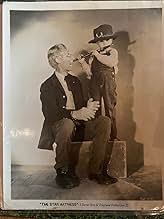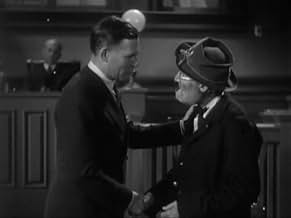Ajouter une intrigue dans votre langueMembers of a family witness two murders, but the gang uses threats, violence and kidnapping to try to keep the members from testifying.Members of a family witness two murders, but the gang uses threats, violence and kidnapping to try to keep the members from testifying.Members of a family witness two murders, but the gang uses threats, violence and kidnapping to try to keep the members from testifying.
- Réalisation
- Scénario
- Casting principal
- Nommé pour 1 Oscar
- 2 victoires et 1 nomination au total
Guy D'Ennery
- Jack Short - Henchman
- (non crédité)
Edgar Dearing
- Jim Sockett - Policeman
- (non crédité)
Mike Donlin
- Mickey - Henchman
- (non crédité)
Tom Dugan
- Deputy Brown
- (non crédité)
Robert Elliott
- Deputy Williams
- (non crédité)
Ben Hall
- Orville - Timekeeper at W.P. Randolph
- (non crédité)
George Irving
- Judge
- (non crédité)
Avis à la une
Smooth programmer from that gangster mecca of the 30's, Warner Bros.- First National. Chic Sale's boisterous old man steals the show as a Civil War vet who's not about to surrender to age. (Actually, Sale's still in his 40's.) The actor spreads it on pretty thick, while the rest of the cast remains surprisingly low-key for the time. As the hard-driving DA, Huston's his usual authoritative self, lending the movie a sense of needed gravity.
Except for the shootout scene, the movie's more a family drama than anything else. Witnesses to the shootout, the Leeds' family, has to decide whether to testify against the chief gangster or endanger the one young son who's being held hostage. In short, is their first duty to community or to family. The dilemma generates the movie's main suspense. My favorite scene, however, is the family dinner where the two little boys see who can out pig-stick the other as the dishes get passed around. It's a lively, well-directed bit of nonsense.
It's easy to miss what Grandpa' s (Sale) sometimes saying when he orates on the duties of being an American. His repeated references to the problems "foreigners" are making sounds rather contemporary (2015). But for Gramps, it sounds like he's blaming Italians since the gangster "Campo" is the one making problems for his family. But then in 1931, big Al Capone was making headlines as the racketeer boss of Chicago. So he may be the real reference behind Gramps' innuendo. Otherwise, the old man makes a pretty good case for putting community first.
That aside, the movie's a generally entertaining, smoothly directed artifact of the period.
Except for the shootout scene, the movie's more a family drama than anything else. Witnesses to the shootout, the Leeds' family, has to decide whether to testify against the chief gangster or endanger the one young son who's being held hostage. In short, is their first duty to community or to family. The dilemma generates the movie's main suspense. My favorite scene, however, is the family dinner where the two little boys see who can out pig-stick the other as the dishes get passed around. It's a lively, well-directed bit of nonsense.
It's easy to miss what Grandpa' s (Sale) sometimes saying when he orates on the duties of being an American. His repeated references to the problems "foreigners" are making sounds rather contemporary (2015). But for Gramps, it sounds like he's blaming Italians since the gangster "Campo" is the one making problems for his family. But then in 1931, big Al Capone was making headlines as the racketeer boss of Chicago. So he may be the real reference behind Gramps' innuendo. Otherwise, the old man makes a pretty good case for putting community first.
That aside, the movie's a generally entertaining, smoothly directed artifact of the period.
Inexpensive but carefully made, this story of a New York family threatened by gangsters is sharply etched and engrossing. Good acting and great camera work enhance this quickie with a topical slant. The overacting by Chic Sale is outrageous but a lot of fun. A thriller with many comic moments, it displays ample amounts of William Wellman's directorial style. A pulp masterpiece that matches Wellman's "Public Enemy" from the same year.
This film, an early William Wellman, has an important message, particularly today. It posits the notion that sometimes there are things more important than your own personal safty or well-being. The film, which has Walter Huston as the lead, is stolen by the performance of "Chic" Sales as Grampa. He's the most completely drawn character in the film and a joy to watch. You'll recognize some familiar faces if you watch many movies from the '20's and '30's. Wel worh your time to watch if you get the opportunity. Recommended.
Charles "Chic" Sales is absolutely terrific as the sole member of the Leeds family willing to testify against a gangster they saw murder a policeman and an informant. He fought at Bull Run in the Civil War and his patriotism runs high, even after his son-in-law is beaten and one of his grandson's is kidnapped by the gang, intimidating all the other members. Fear of his grandson's death is no excuse, he says. He wouldn't want his grandson living in a country run by gangsters anyway. The conflict between civic duty and personal safety is driven home sharply in this Oscar-nominated story. Walter Huston is also a standout as the hard driving district attorney threatening the family with perjury if they don't back up their identification of the killer in court. The rest of the cast, including the sleazy killer, Ralph Ince, are all excellent, and the film is snappily directed by William A. Wellman. There's also good suspense, as Sales disappears just as the trial is about to begin.
In The Star Witness gangster chief Ralph Ince makes two big mistakes. One is that he does commit a murder. The second is that in escaping he did a brief home invasion of your average American family who are now mostly witnesses to the crime he committed. But getting them to tell their story is the subject of this film and it's what District Attorney Walter Huston has to do.
You can't get much more average than the Leeds family. Father and mother Grant Mitchell and Frances Starr, children, Sally Blane, Edward Nugent, George Ernest, and Dickie Moore. And they have their maternal grandfather Chic Sale living with them as well. He's the only one that wants to do his civic duty and hence he's Huston's Star Witness.
Sale has a really great part as the feisty old Civil War veteran and he steals every scene he's in, even from Walter Huston. He also speaks some of the more ethnocentric lines that mirror the view that The Star Witness takes about foreigners coming in to ruin this country. That was not an uncommon view of what Middle America thought of the urban gangsters who seem to come up from nowhere during those Prohibition days.
The Leeds family endures a lot, a beating to one family member and a kidnapping of another. The film earned an Oscar nomination for Best Original Screenplay. And the shootout with the gang and law enforcement is one of the best that Warner Brothers did at the time. Of course this having been directed by William Wellman who did The Public Enemy that year, you would expect the best.
You can't get much more average than the Leeds family. Father and mother Grant Mitchell and Frances Starr, children, Sally Blane, Edward Nugent, George Ernest, and Dickie Moore. And they have their maternal grandfather Chic Sale living with them as well. He's the only one that wants to do his civic duty and hence he's Huston's Star Witness.
Sale has a really great part as the feisty old Civil War veteran and he steals every scene he's in, even from Walter Huston. He also speaks some of the more ethnocentric lines that mirror the view that The Star Witness takes about foreigners coming in to ruin this country. That was not an uncommon view of what Middle America thought of the urban gangsters who seem to come up from nowhere during those Prohibition days.
The Leeds family endures a lot, a beating to one family member and a kidnapping of another. The film earned an Oscar nomination for Best Original Screenplay. And the shootout with the gang and law enforcement is one of the best that Warner Brothers did at the time. Of course this having been directed by William Wellman who did The Public Enemy that year, you would expect the best.
Le saviez-vous
- Anecdotes"Variety" reported that the film was rushed into release because of a gang shooting in Harlem in which several children were shot and the police could not get witnesses to talk. The Motion Picture Herald also reported that Warner Bros. gave the proceeds of the first two performances at The Winter Garden to the families of the children who were shot during gang warfare in Little Italy.
- GaffesTwo men are shot in the back while running away, but they clutch their chests as they fall down.
- Crédits fousIntro: "A neighborhood of plain people - - in an American city of today."
- ConnexionsVersion of The Man Who Dared (1939)
- Bandes originalesYankee Doodle
(ca. 1755) (uncredited)
Traditional music of English origin
Played often on a fife by Charles 'Chic' Sale
Meilleurs choix
Connectez-vous pour évaluer et suivre la liste de favoris afin de recevoir des recommandations personnalisées
Détails
- Date de sortie
- Pays d’origine
- Langues
- Aussi connu sous le nom de
- Star Witness
- Lieux de tournage
- Société de production
- Voir plus de crédits d'entreprise sur IMDbPro
- Durée
- 1h 8min(68 min)
- Couleur
Contribuer à cette page
Suggérer une modification ou ajouter du contenu manquant





































